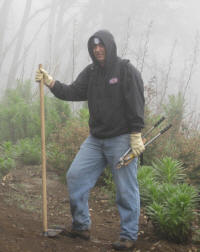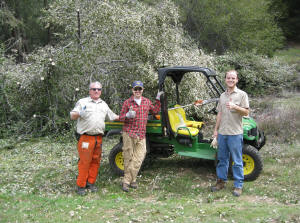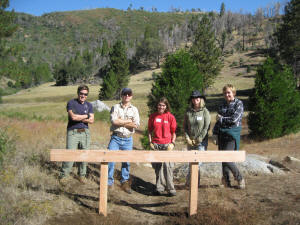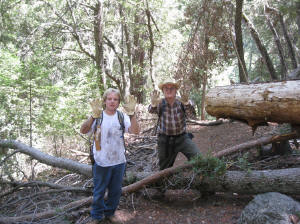|
TRAIL MAINTENANCE UNIT (TMU)
|
|
The Palomar Mountain
State Park Trail Maintenance Unit (TMU) works to ensure that the trails are clear and safe
for hikers.  We
provide all the tools. We
provide all the tools.
To be a TMU volunteer at Palomar
Mountain State Park, there are some
basic, common sense requirements (details below), but you don't have pay
any dues or make a time commitment. You're in the driver's seat when it
comes to your level of participation. You can be part of our crew as
a "casual" non-member volunteer, or you can become a full-fledged member
— it's entirely up to you.
Our #1
priority by far is safety! Our second priority is personal
fulfillment, whether it's just having a good time or enjoying a sense of contributing
to the community. Productivity is last! Of course we want to get the job
done, but you may work at
your pace and comfort level, as long as you observe all safety
requirements and follow instructions.
NOTE: ALL VOLUNTEER TRAIL WORK AT PALOMAR MOUNTAIN STATE PARK IS DONE
EXCLUSIVELY THROUGH THIS AUTHORIZED TRAIL MAINTENANCE UNIT.
DO NOT ENGAGE IN ANY TRAIL MAINTENANCE ON YOUR OWN.
|
|
|
What kind
of work do TMU volunteers do exactly?
If you like being outdoors
on the trail, getting grubby with a great bunch of people, and being
able to step back and admire your handiwork, being a Palomar "trail
hand" might be for you!
Currently on Palomar,
about 95% of our time is spent removing material from trails that impede
hikers: overgrowth impinging on the path and downed trees and
branches that have fallen on the path. About 5% of our time is
spent on tread work (working on the soil) and odd jobs — re-contouring a
path to improve watershed, re-installing a trail marker, hammering down
an erosion barrier that has lifted up, creating a barrier to a false
trail, etc.

The tools we use for
most of these tasks are versions of simple hand tools you've probably used around
your house: loppers (long-handled nippers), pruning saws, bow rakes and
hoes. From time to time
we'll use McCleods (a heavy-duty rake & hoe combo) or our 3.5' logging
saw, supplemented with an axe. We provide all tools; you
don't need to bring tools. However,
currently we don't use power tools (e.g., chain saws, gas powered
clippers or weed whackers). Using these requires special training and
certification.
Some of our work falls
into a different category: repair and restoration, such as bridge repair
and erosion repair. Our participation in these activities is limited at
this time. For structural repair (e.g., bridges), we assist regular park
maintenance staff who are skilled in this area. For trail restoration
(e.g., erosion, logging damage), we must rely on more experienced TMU
people from Cuyamaca as they become available. This also goes for
cutting up larger logs that require a chain saw.
|
|
How often
do you work?
 We
generally try to work the last Sunday of each month. The crew leader will
give as much advance notice as possible via an email announcement. In
the winter and early spring, there's a chance that we have to make last
minute changes due to weather. We
generally try to work the last Sunday of each month. The crew leader will
give as much advance notice as possible via an email announcement. In
the winter and early spring, there's a chance that we have to make last
minute changes due to weather.
|
|
What's a
typical work session like?
At the appointed hour
(usually 8:30 a.m.),
we meet at the parking lot beside the Silvercrest picnic area, close to
the park kiosk (headquarters). YOU DO NOT HAVE TO PAY THE DAY USE FEE
ON THE DAY YOU WORK. Everyone signs in, and then the crew
leader discusses the objectives for the day and reminds everyone about
safety. We grab our tools and head out. Throughout the day we'll take
rest breaks.
We always work at least 4 hours...
sometimes up to 5 if the job requires it and crew members are OK with
it. You are free to leave early if you need to. Since the drive for
many people is over 2 hours round trip, we try to make every work party
count.
|
| |
|
Are there any requirements?
All volunteers must be
able to work outside in differing weather conditions at altitudes of
5,000+ feet and hike 1-3 miles per day. Trail terrain may be rugged and
uneven. Without exception, all volunteers must be able to hike and work
safely and volunteers must possess an attitude that all tasks will be
performed in a safe manner. Requests for "Reasonable Accommodation"
under the Americans with Disabilities Act will be decided on a case by
case basis by the Park Superintendent or designee.
In addition to having
basic manual dexterity, you must be able to bend, push, pull, lift,
carry, stand, grip, walk, squat, drag and climb. You must also be able
to speak and hear sufficiently to hear commands and respond, and you
must also be able to hear and see sufficiently to perceive danger.
Minors are welcome to
join us but they must be accompanied by a parent at all times ---
not another relative, a friend of the
family or the parent of the minor's friend. A State of California
"Parental/Guardian Permission for Juvenile Volunteers" (provided at
sign-in) must be completed and signed by the parent. Of course children
won't be expected to be as productive as adults — in fact, we understand
that they may not be there to work but rather to simply be part of the
experience — but they must be
under control at all times and capable of understanding and obeying all
instructions. Minors aged 14 and up may become full-fledged members, but
they must still be accompanied by a parent at all times until reaching
18.
|
| |
Sounds like something I might
like to do! How can I give it a try to see if I like it?
Here's how
you can give us a test drive...
|
|